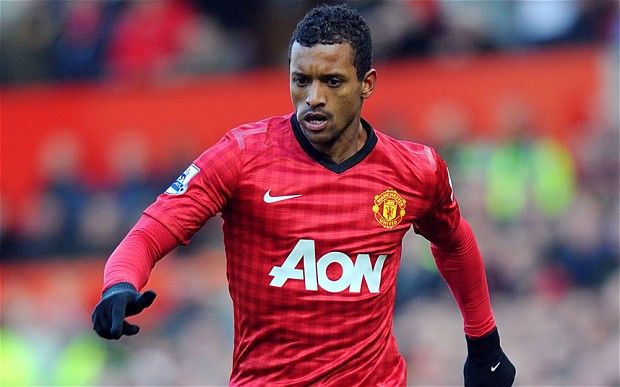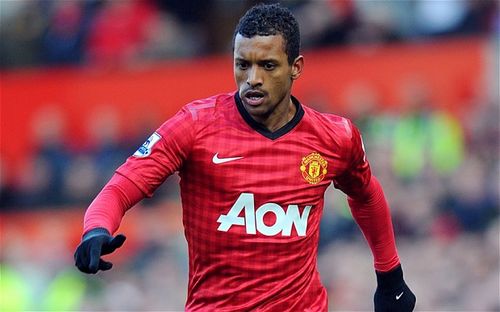
Nani and the weight of impossible comparisons

Nani
Fussing over shirt numbers and their relevance on the pitch is one of the enduring, yet endearing, peculiarities of football. At Manchester United, the proud tradition of the number 7 is particularly important. It is a shirt that has graced many a great player – Best, Cantona, Robson, Beckham – not all of whom were right midfielders. Of late though, the shirt has predominantly been identified with a winger par excellence.
Several years ago, a young Portuguese winger joined Manchester United from Sporting Lisbon, where he was tipped for similar greatness. I’m talking, of course, about Luis Nani, who has spent his entire career wriggling out of the all-consuming shadow of countryman and former United teammate Cristiano Ronaldo.
To Old Trafford observers and non-Mancunians alike, the news of his contract renewal last week came as something of a surprise. Nani has long been linked with a move away from the club, with Inter Milan being touted as a potential suitor. Still more surprising is the 5-year deal he has been handed on improved terms. In terms of ability, consistency and temperament Nani is not a player who can deliver titles, and Sir Alex Ferguson was hardly unaware of this.
Four years into his United career, he produced his best performance in a red shirt to destroy Gael Clichy at the Emirates, leading to hopes that the best was yet to come. Yet, over the seasons that followed, his potential has stayed largely untapped – or when it does erupt, it whizzes to and fro uncontrollably. He is unlikely to be the first name on David Moyes’ teamsheet next weekend, or any time soon.
Outgrowing the comparisons
The problem with Nani isn’t that he is not good enough. It is that the Ronaldo comparisons weigh heavily on him, manifested every time he tries to highlight himself on the field. All too often, Nani attempts the spectacular rather than the sane (or the unselfish), going solo rather than playing a common-sense pass into the penalty box, leaving Wayne Rooney or Robin van Persie grimacing in frustration as he gets knackered by defenders.
Daniel Sturridge was reckoned to be selfish till last season. Arjen Robben still is. Nani beats them both hands down – even with a teammate clear in front of goal, he prefers to shoot if he has the ball. And when he scores, his trademark celebration is to point at his name on the back of his shirt. Make no mistake – Nani is acutely conscious of the persona he is supposed to live upto. Every moment on the field, he tries, fails, retries – and all through, he resents it.
Why the comparisons are downright silly
Ronaldo and Nani share club history, nationality and position. The similarities are noticed and remarked upon all too often, as some kind of divine proof that they are footballing twins by different mothers. For Nani, though, the comparison has served as a psychological straitjacket, a Big Brother casting a pall over his every action.
All too often, comparisons are a manifestation of lazy journalism : trying to define one player in terms of another, instead of evaluating him on his own merits. And in this case, the resemblance is largely superficial. It’s as laughable as cramming Abou Diaby into Patrick Vieira’s titanic silhouette, just because both are French players of African descent who perform the same midfield role; or to claim that Jordan Henderson is the next Steven Gerrard, for reasons that I’m still unclear about.
Of course, neither is a bad player. To have Arsene Wenger’s trust through 7 injury-wracked years implies that Diaby is capable of delivering when his ankles behave themselves. His starburst at the start of last season is ample proof. Henderson likewise will do well in a different role, one more suited to his abilities. But neither will ever be Vieira or Gerrard, simply because players like that come along once in a generation.
And Nani will never be Ronaldo. He is a good player on his own terms, but lacks the temperament or the blessing of sheer raw quality to regularly influence the outcome of matches big and small; gifted but inconsistent, he is capable of turning a match on its head, but very infrequently. When he did make headlines last season, it was not for a sensational match-winning strike or assist, but for an unintentional aerial assault on Alvaro Arbeloa. He is excellent on the ball, but doesn’t channelize that excellence for his team’s benefit.
Moyes’ generosity is perhaps reflective of his lack of options on the wings: neither Ashley Young nor Antonio Valencia has short odds on the goalscorer betting slips, and the soon-to-be-40 Ryan Giggs, who is often deployed as a consequence, is well past the autumn of a career that seemingly will never end. Nani is thus the wide attacker-in-chief for the present. But a move abroad would perhaps salvage his career, while freeing him from the burden of an impossible mantle.
Incidentally, the number 7 shirt is currently unoccupied at Manchester United. Following a stellar 2011-12 season, the shirt was handed to Antonio Valencia as the club’s new touchline maestro. But after struggling with form for a year, Valencia returned the shirt. He now dons his old number 25.
Perhaps it was a wise move. The weight of unrealistic expectations can be a heavy one to bear.